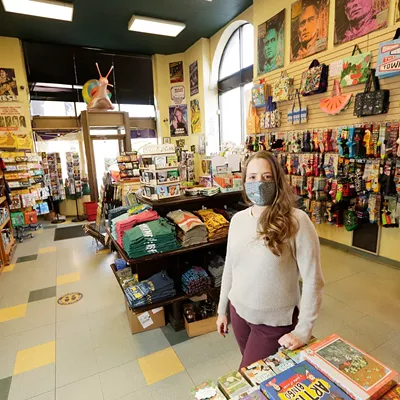Closed Captions
A pandemic-inspired poem
[
{
"name": "Broadstreet - Instory",
"component": "25846487",
"insertPoint": "4",
"requiredCountToDisplay": "4"
},{
"name": "Broadstreet - Empower Local",
"component": "27852456",
"insertPoint": "8",
"requiredCountToDisplay": "8"
},{
"name": "Broadstreet - Instory",
"component": "25846487",
"insertPoint": "12",
"requiredCountToDisplay": "12"
},{
"name": "Broadstreet - Instory - 728x90 / 970x250",
"component": "27852677",
"insertPoint": "18",
"requiredCountToDisplay": "18"
},{
"name": "Broadstreet - Instory",
"component": "25846487",
"insertPoint": "5th",
"startingPoint": "23",
"requiredCountToDisplay": "24",
"maxInsertions": 100
}
]
One week in, the captions on our laptop movie keep
announcing, ominous music intensifying as the branches creak,
ominous music intensifying as the family’s goat, Black Phillip,
turns out to be the devil. We have all closed our doors
around whatever we live with. Greenland and South Africa
have banned liquor for health, or to try to staunch the beatings.
We have all sanitized our doorknobs and closed our doors,
although the news saws open holes for a pipe-organ Wurlitzering
ominousness as we grind our coffee, as Perfume Genius intones
‘Cause it’s singing through your body And I’m carried by the sound.
In the movie, which is balanced on my husband’s knees in bed,
the children circle the goat, obliviously singing to it, as we once
held other children’s hands, chanting Ring around a rosey, falling
dizzily to lawns. In each generation, someone spills the secret:
that song’s about the plague, and children shiver, hearing, inside
their music-box play, something ominous and ancient.
Someone has turned up the soundtrack of that ancient world.
In the movie, which is called The Witch, an actual witch is snatching
and grinding up children. This is what the Puritan family fears,
exiled at the edge of the forest, and they are right to fear it. Obviousness
goes so far it circles back to the unlikely. It is terrifying
when what we fear is flying through the air really is flying.
We are alone, or we are not alone. When our neighbors set off fireworks,
concussive, staggered barely by air, it sounds so much like shots,
I think first double homicide, suicide. We’ve all closed in whoever we live with.
We’ve all closed down around our own anxieties. I am mildly afraid
of the water glass I touch after touching the mail. Mildly surprised the person
in the white horror-movie mask is not a pranking friend but a Zoom bomber
who listens in, tugging at a rubber chin, as my friends in Italy tell about barricades,
death tolls. There are the wrong kinds of masks, or no masks.
In the movie, the oldest daughter keeps insisting the evil isn’t her,
but her parents are so afraid, they trust no one. It is part of horror
that sometimes everyone dies. Part of American religiosity to believe
in exceptional salvation and sin. There are politicians grinding up facts
and profit and time. We should have seen this coming, or we did.
We have closed the entire internet into our houses, so when that masked
face stares, I think, What if he hurts us? But none of us is really here to hurt.
I am reading facts. I am trying to stay rational. My friends and I lean toward
each other’s small, boxed faces. It’s hard to hear the words in real time,
though sometimes they catch us, jolting, seconds after, to our open mouths.
My husband and I can’t understand all the 17th -century Puritan brogue,
so we’ve turned on these captions, but no one is speaking now. We are at the edge
of the wilderness, a place maybe we’ve always been. We’re spinning
between fear and safety and fear and. The branches are creaking.
There’s ominous music intensifying, though it just did seconds ago.
It is part of horror that what could be the end isn’t. Sometimes
it’s also part of being lucky. Is the music actually louder than last time?
Or does the caption mean louder than the goat and voices?
Or that even the simplest acts, like breathing,
like sitting in this bed, are intensifying?
Alexandra Teague is the author of three poetry collections — Or What We’ll Call Desire (Persea 2019), The Wise and Foolish Builders, and Mortal Geography — and the novel The Principles Behind Flotation, and co-editor of Bullets into Bells: Poets & Citizens Respond to Gun Violence. She is a professor at University of Idaho.
announcing, ominous music intensifying as the branches creak,
ominous music intensifying as the family’s goat, Black Phillip,
turns out to be the devil. We have all closed our doors
around whatever we live with. Greenland and South Africa
have banned liquor for health, or to try to staunch the beatings.
We have all sanitized our doorknobs and closed our doors,
although the news saws open holes for a pipe-organ Wurlitzering
ominousness as we grind our coffee, as Perfume Genius intones
‘Cause it’s singing through your body And I’m carried by the sound.
In the movie, which is balanced on my husband’s knees in bed,
the children circle the goat, obliviously singing to it, as we once
held other children’s hands, chanting Ring around a rosey, falling
dizzily to lawns. In each generation, someone spills the secret:
that song’s about the plague, and children shiver, hearing, inside
their music-box play, something ominous and ancient.
Someone has turned up the soundtrack of that ancient world.
In the movie, which is called The Witch, an actual witch is snatching
and grinding up children. This is what the Puritan family fears,
exiled at the edge of the forest, and they are right to fear it. Obviousness
goes so far it circles back to the unlikely. It is terrifying
when what we fear is flying through the air really is flying.
We are alone, or we are not alone. When our neighbors set off fireworks,
concussive, staggered barely by air, it sounds so much like shots,
I think first double homicide, suicide. We’ve all closed in whoever we live with.
We’ve all closed down around our own anxieties. I am mildly afraid
of the water glass I touch after touching the mail. Mildly surprised the person
in the white horror-movie mask is not a pranking friend but a Zoom bomber
who listens in, tugging at a rubber chin, as my friends in Italy tell about barricades,
death tolls. There are the wrong kinds of masks, or no masks.
In the movie, the oldest daughter keeps insisting the evil isn’t her,
but her parents are so afraid, they trust no one. It is part of horror
that sometimes everyone dies. Part of American religiosity to believe
in exceptional salvation and sin. There are politicians grinding up facts
and profit and time. We should have seen this coming, or we did.
We have closed the entire internet into our houses, so when that masked
face stares, I think, What if he hurts us? But none of us is really here to hurt.
I am reading facts. I am trying to stay rational. My friends and I lean toward
each other’s small, boxed faces. It’s hard to hear the words in real time,
though sometimes they catch us, jolting, seconds after, to our open mouths.
My husband and I can’t understand all the 17th -century Puritan brogue,
so we’ve turned on these captions, but no one is speaking now. We are at the edge
of the wilderness, a place maybe we’ve always been. We’re spinning
between fear and safety and fear and. The branches are creaking.
There’s ominous music intensifying, though it just did seconds ago.
It is part of horror that what could be the end isn’t. Sometimes
it’s also part of being lucky. Is the music actually louder than last time?
Or does the caption mean louder than the goat and voices?
Or that even the simplest acts, like breathing,
like sitting in this bed, are intensifying?
Alexandra Teague is the author of three poetry collections — Or What We’ll Call Desire (Persea 2019), The Wise and Foolish Builders, and Mortal Geography — and the novel The Principles Behind Flotation, and co-editor of Bullets into Bells: Poets & Citizens Respond to Gun Violence. She is a professor at University of Idaho.





















